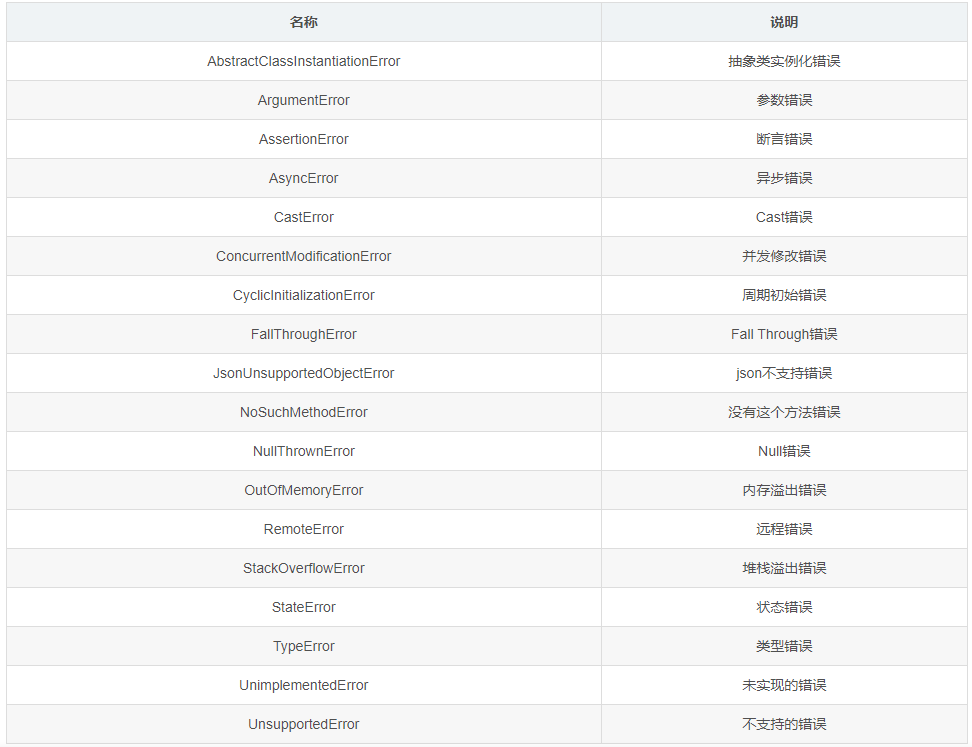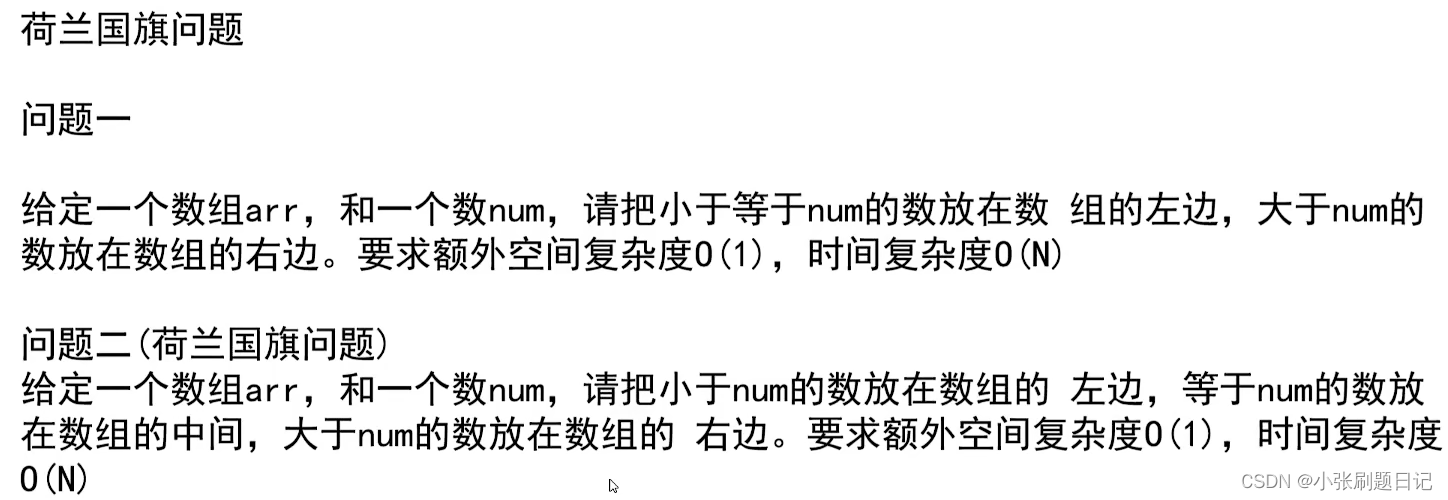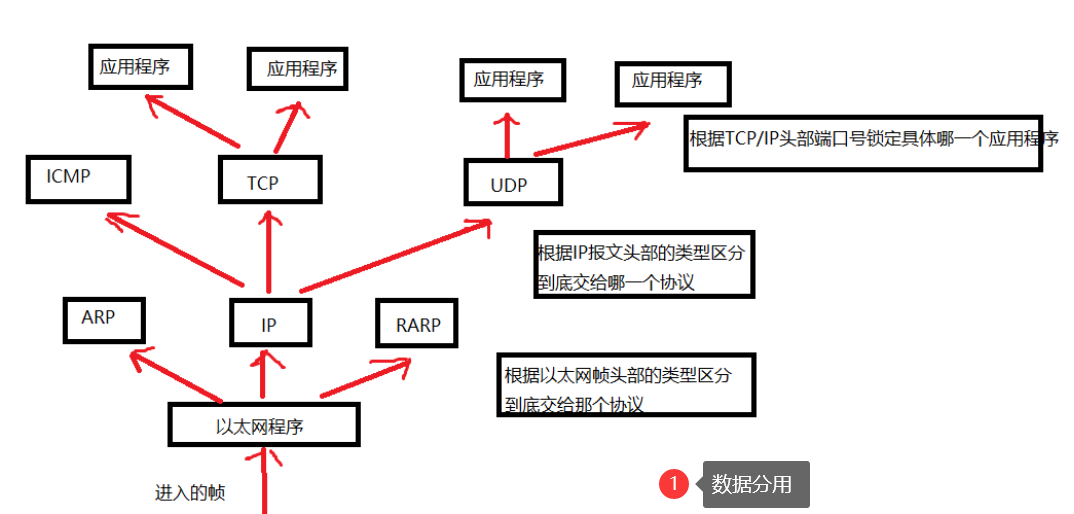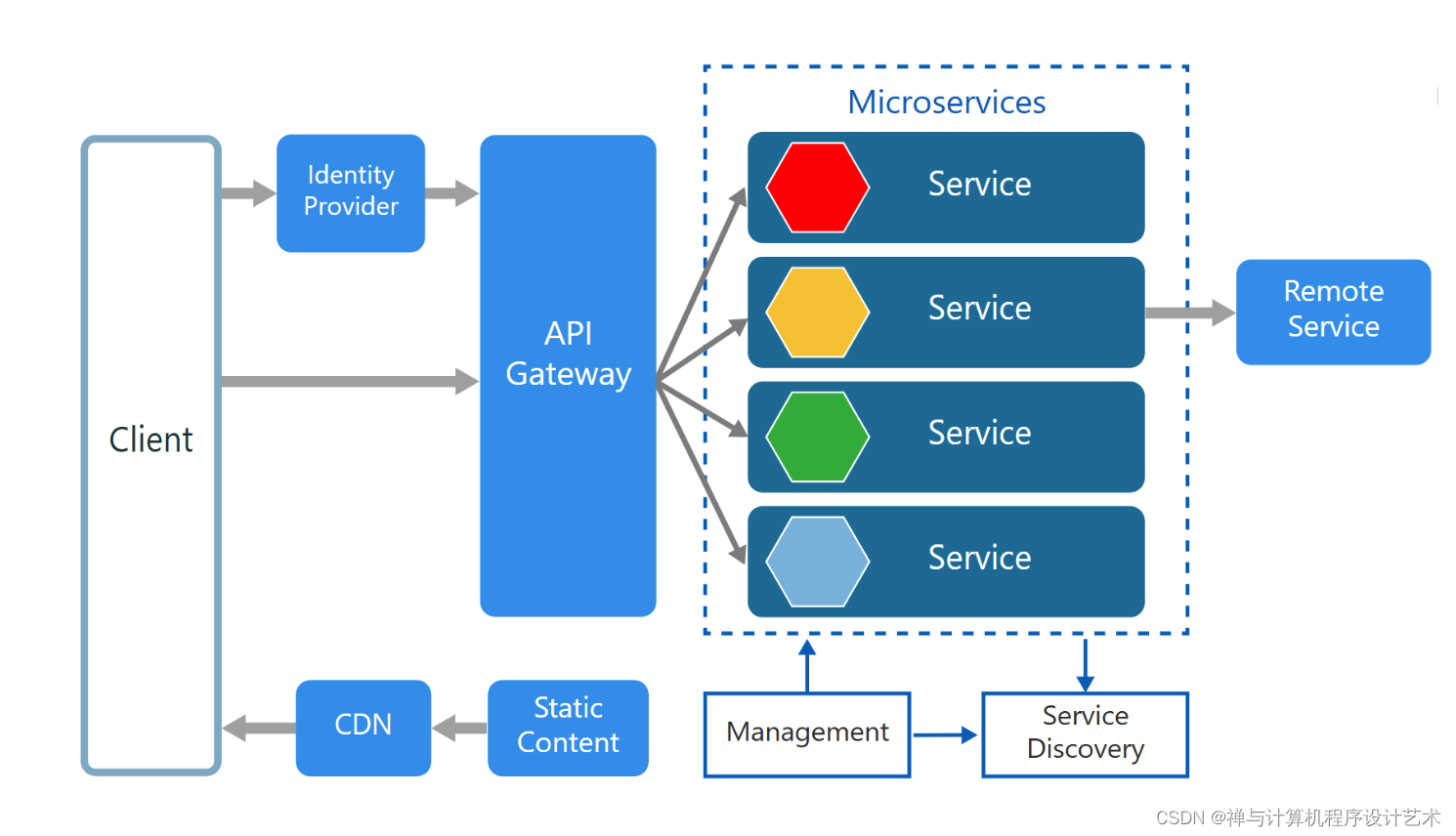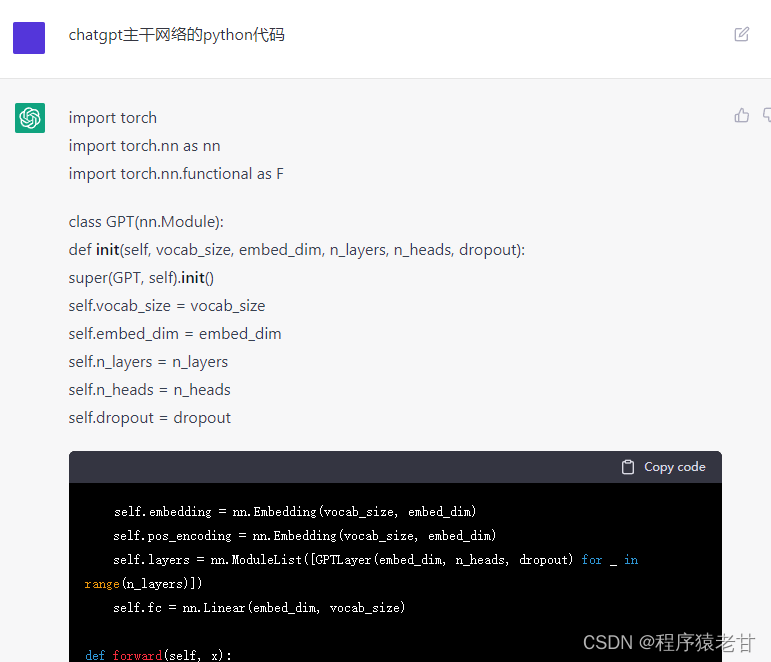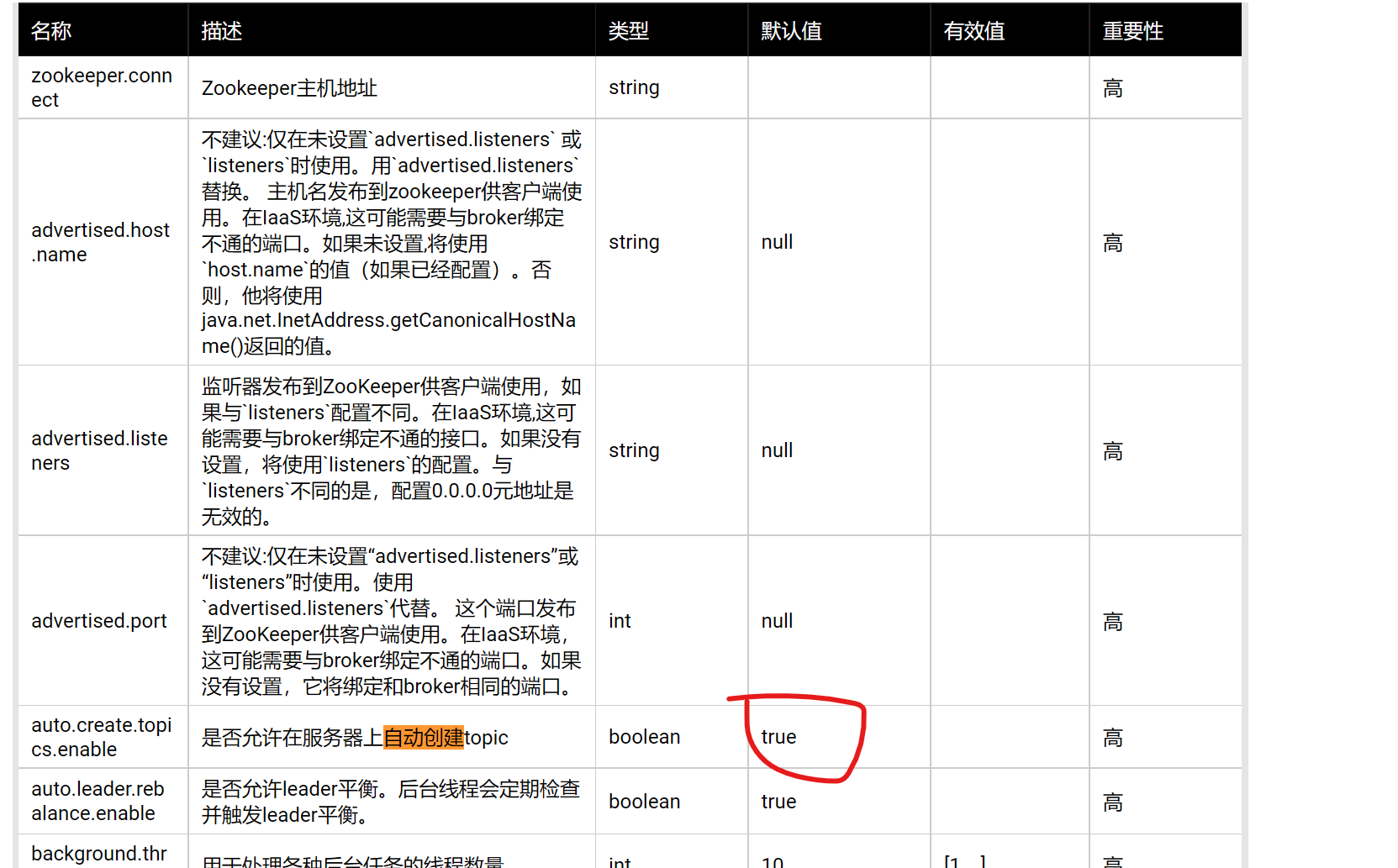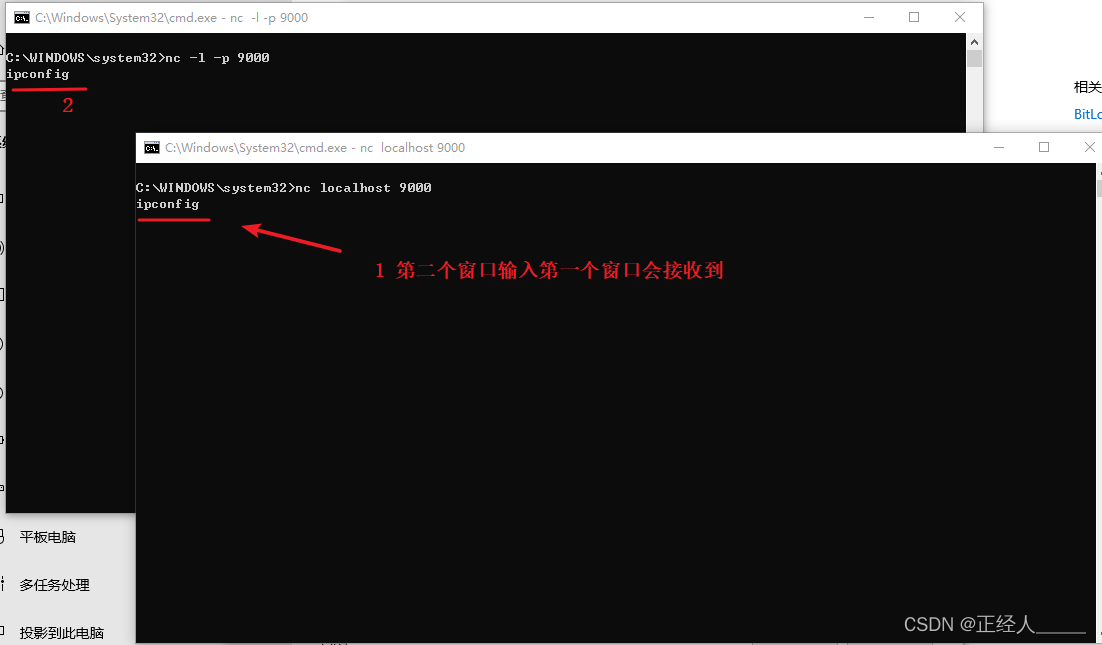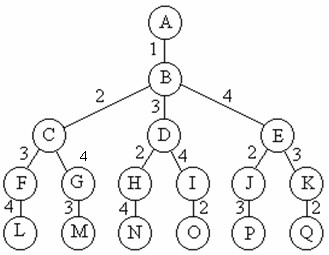Halo,这里是Ppeua。平时主要更新C语言,C++,数据结构算法......感兴趣就关注我吧!你定不会失望。
🌈个人主页:主页链接
🌈算法专栏:专栏链接
我会一直往里填充内容哒!
🌈LeetCode专栏:专栏链接
目前在刷初级算法的LeetBook 。若每日一题当中有力所能及的题目,也会当天做完发出
🌈代码仓库:Gitee链接
🌈点击关注=收获更多优质内容🌈
目录
1. 程序的翻译环境和执行环境:
2. 详解编译+链接
2.1翻译环境
2.2 编译本身也分为几个阶段 预编译,编译与处理.
2.21预编译
2.22编译
2.23汇编阶段
2.3链接
3. 预处理详解
3.1 预定义符号
3.2 #define
3.2.1#define 定义宏
3.2.2 #define 替换规则
3.2.3 #和##
3.2.4 宏和函数对比
3.2.7 命名约定
3.3 #undef
3.4 命令行定义
3.5 文件包含
完结撒花:
1. 程序的翻译环境和执行环境:
在ANSI C的任何一种实现中,存在两个不同的环境。
第1种是翻译环境,在这个环境中源代码被转换为可执行的机器指令。
第2种是执行环境,它用于实际执行代码
在计算机当中,只能执行二进制编码,那我们的编程语言又是如何转换成二进制编码的呢?
以我们常用的vs为例,这是一个集成开发环境,从.c到.exe都可以由他来完成.
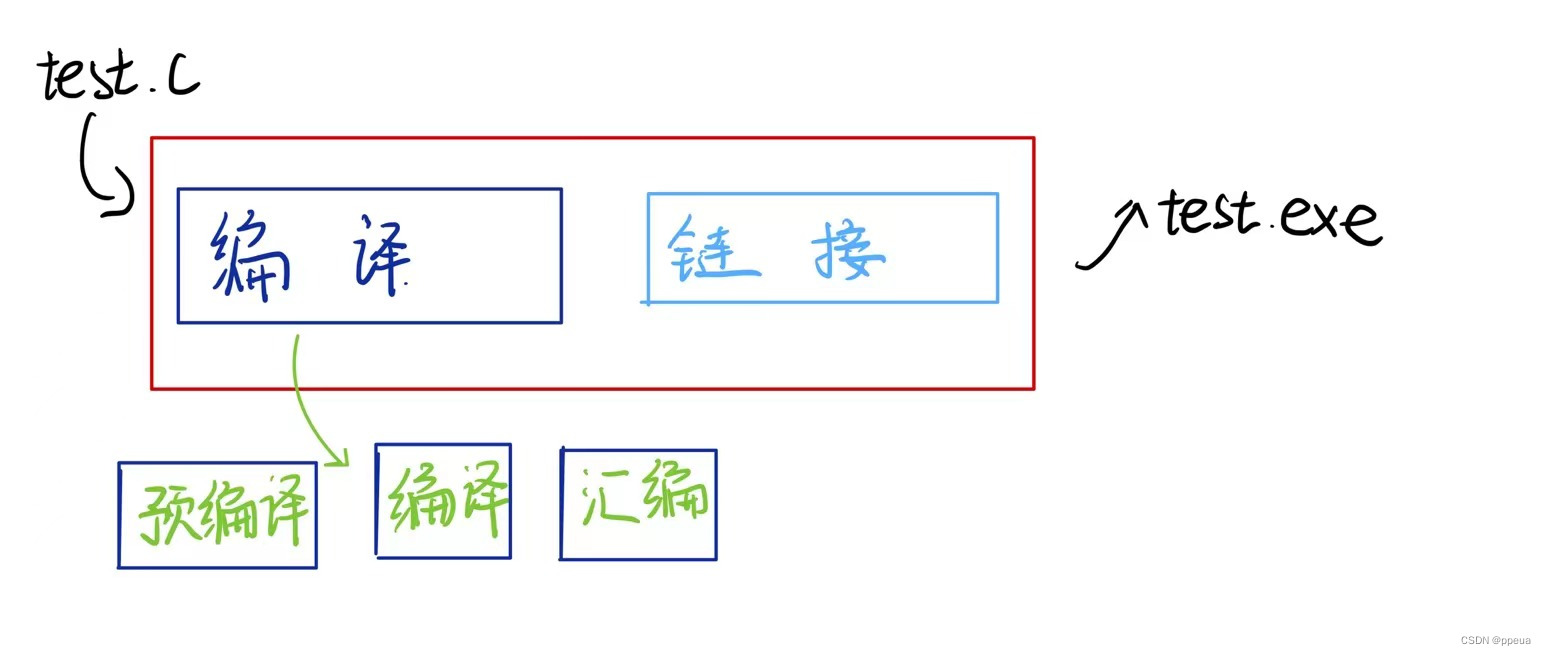
经过编译与链接这两个大步骤,就可以生成可执行程序.
2. 详解编译+链接
2.1翻译环境
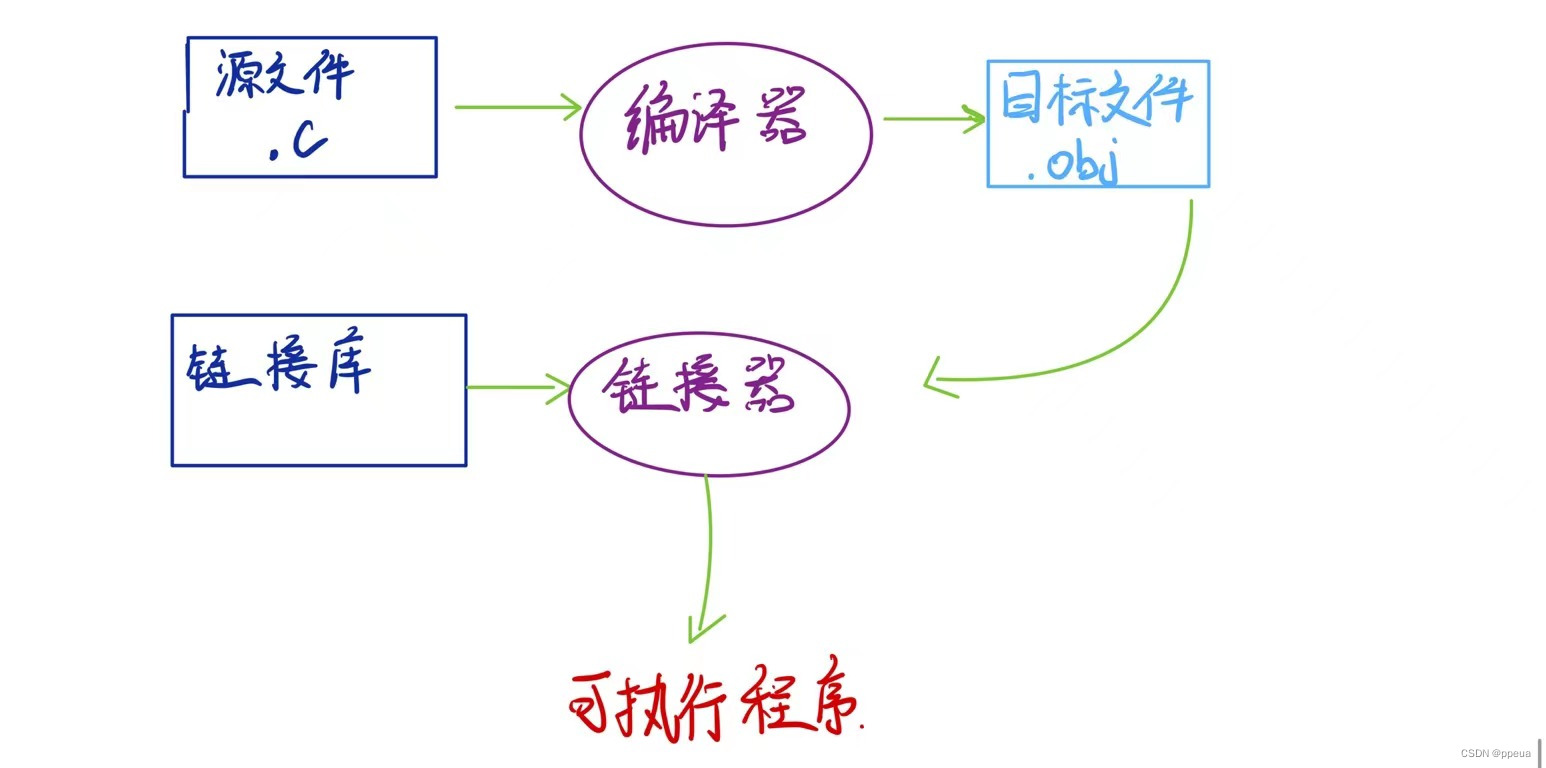
组成一个程序的每个源文件通过编译过程分别转换成目标代码(object code)。
每个目标文件由链接器(linker)捆绑在一起,形成一个单一而完整的可执行程序。
链接器同时也会引入标准C函数库中任何被该程序所用到的函数,而且它可以搜索程序员个人的程序库,将其需要的函数也链接到程序中
2.2 编译本身也分为几个阶段 预编译,编译与处理.
2.21预编译
预处理阶段会将预处理指令进行替换
如下的#include 与 #define都是预处理指令。
#include<stdio.h>
#define MAX 5
int main()
{
printf("%d",MAX);
return 0;
//预处理
}使用gcc执行:gcc -E test.c -o test.i 可在预处理后停下.这时预处理指令替换完成
define定义的常量进行文本替换 include所包含的头文件被展开,注释将被删除
# 1 "test.c"
# 1 "<built-in>"
# 1 "<command-line>"
# 31 "<command-line>"
# 1 "/usr/include/stdc-predef.h" 1 3 4
# 32 "<command-line>" 2
# 1 "test.c"
# 1 "/usr/include/stdio.h" 1 3 4
# 27 "/usr/include/stdio.h" 3 4
# 1 "/usr/include/x86_64-linux-gnu/bits/libc-header-start.h" 1 3 4
# 33 "/usr/include/x86_64-linux-gnu/bits/libc-header-start.h" 3 4
# 1 "/usr/include/features.h" 1 3 4
# 461 "/usr/include/features.h" 3 4
# 1 "/usr/include/x86_64-linux-gnu/sys/cdefs.h" 1 3 4
# 452 "/usr/include/x86_64-linux-gnu/sys/cdefs.h" 3 4
# 1 "/usr/include/x86_64-linux-gnu/bits/wordsize.h" 1 3 4
# 453 "/usr/include/x86_64-linux-gnu/sys/cdefs.h" 2 3 4
# 1 "/usr/include/x86_64-linux-gnu/bits/long-double.h" 1 3 4
# 454 "/usr/include/x86_64-linux-gnu/sys/cdefs.h" 2 3 4
# 462 "/usr/include/features.h" 2 3 4
# 485 "/usr/include/features.h" 3 4
# 1 "/usr/include/x86_64-linux-gnu/gnu/stubs.h" 1 3 4
# 10 "/usr/include/x86_64-linux-gnu/gnu/stubs.h" 3 4
# 1 "/usr/include/x86_64-linux-gnu/gnu/stubs-64.h" 1 3 4
# 11 "/usr/include/x86_64-linux-gnu/gnu/stubs.h" 2 3 4
# 486 "/usr/include/features.h" 2 3 4
# 34 "/usr/include/x86_64-linux-gnu/bits/libc-header-start.h" 2 3 4
# 28 "/usr/include/stdio.h" 2 3 4
# 1 "/usr/lib/gcc/x86_64-linux-gnu/9/include/stddef.h" 1 3 4
# 209 "/usr/lib/gcc/x86_64-linux-gnu/9/include/stddef.h" 3 4
# 209 "/usr/lib/gcc/x86_64-linux-gnu/9/include/stddef.h" 3 4
typedef long unsigned int size_t;
# 34 "/usr/include/stdio.h" 2 3 4
# 1 "/usr/lib/gcc/x86_64-linux-gnu/9/include/stdarg.h" 1 3 4
# 40 "/usr/lib/gcc/x86_64-linux-gnu/9/include/stdarg.h" 3 4
typedef __builtin_va_list __gnuc_va_list;
# 37 "/usr/include/stdio.h" 2 3 4
# 1 "/usr/include/x86_64-linux-gnu/bits/types.h" 1 3 4
# 27 "/usr/include/x86_64-linux-gnu/bits/types.h" 3 4
# 1 "/usr/include/x86_64-linux-gnu/bits/wordsize.h" 1 3 4
# 28 "/usr/include/x86_64-linux-gnu/bits/types.h" 2 3 4
# 1 "/usr/include/x86_64-linux-gnu/bits/timesize.h" 1 3 4
# 29 "/usr/include/x86_64-linux-gnu/bits/types.h" 2 3 4
typedef unsigned char __u_char;
typedef unsigned short int __u_short;
typedef unsigned int __u_int;
typedef unsigned long int __u_long;
typedef signed char __int8_t;
typedef unsigned char __uint8_t;
typedef signed short int __int16_t;
typedef unsigned short int __uint16_t;
typedef signed int __int32_t;
typedef unsigned int __uint32_t;
typedef signed long int __int64_t;
typedef unsigned long int __uint64_t;
typedef __int8_t __int_least8_t;
typedef __uint8_t __uint_least8_t;
typedef __int16_t __int_least16_t;
typedef __uint16_t __uint_least16_t;
typedef __int32_t __int_least32_t;
typedef __uint32_t __uint_least32_t;
typedef __int64_t __int_least64_t;
typedef __uint64_t __uint_least64_t;
typedef long int __quad_t;
typedef unsigned long int __u_quad_t;
typedef long int __intmax_t;
typedef unsigned long int __uintmax_t;
# 141 "/usr/include/x86_64-linux-gnu/bits/types.h" 3 4
# 1 "/usr/include/x86_64-linux-gnu/bits/typesizes.h" 1 3 4
# 142 "/usr/include/x86_64-linux-gnu/bits/types.h" 2 3 4
# 1 "/usr/include/x86_64-linux-gnu/bits/time64.h" 1 3 4
# 143 "/usr/include/x86_64-linux-gnu/bits/types.h" 2 3 4
typedef unsigned long int __dev_t;
typedef unsigned int __uid_t;
typedef unsigned int __gid_t;
typedef unsigned long int __ino_t;
typedef unsigned long int __ino64_t;
typedef unsigned int __mode_t;
typedef unsigned long int __nlink_t;
typedef long int __off_t;
typedef long int __off64_t;
typedef int __pid_t;
typedef struct { int __val[2]; } __fsid_t;
typedef long int __clock_t;
typedef unsigned long int __rlim_t;
typedef unsigned long int __rlim64_t;
typedef unsigned int __id_t;
typedef long int __time_t;
typedef unsigned int __useconds_t;
typedef long int __suseconds_t;
typedef int __daddr_t;
typedef int __key_t;
typedef int __clockid_t;
typedef void * __timer_t;
typedef long int __blksize_t;
typedef long int __blkcnt_t;
typedef long int __blkcnt64_t;
typedef unsigned long int __fsblkcnt_t;
typedef unsigned long int __fsblkcnt64_t;
typedef unsigned long int __fsfilcnt_t;
typedef unsigned long int __fsfilcnt64_t;
typedef long int __fsword_t;
typedef long int __ssize_t;
typedef long int __syscall_slong_t;
typedef unsigned long int __syscall_ulong_t;
typedef __off64_t __loff_t;
typedef char *__caddr_t;
typedef long int __intptr_t;
typedef unsigned int __socklen_t;
typedef int __sig_atomic_t;
# 39 "/usr/include/stdio.h" 2 3 4
# 1 "/usr/include/x86_64-linux-gnu/bits/types/__fpos_t.h" 1 3 4
# 1 "/usr/include/x86_64-linux-gnu/bits/types/__mbstate_t.h" 1 3 4
# 13 "/usr/include/x86_64-linux-gnu/bits/types/__mbstate_t.h" 3 4
typedef struct
{
int __count;
union
{
unsigned int __wch;
char __wchb[4];
} __value;
} __mbstate_t;
# 6 "/usr/include/x86_64-linux-gnu/bits/types/__fpos_t.h" 2 3 4
typedef struct _G_fpos_t
{
__off_t __pos;
__mbstate_t __state;
} __fpos_t;
# 40 "/usr/include/stdio.h" 2 3 4
# 1 "/usr/include/x86_64-linux-gnu/bits/types/__fpos64_t.h" 1 3 4
# 10 "/usr/include/x86_64-linux-gnu/bits/types/__fpos64_t.h" 3 4
typedef struct _G_fpos64_t
{
__off64_t __pos;
__mbstate_t __state;
} __fpos64_t;
# 41 "/usr/include/stdio.h" 2 3 4
# 1 "/usr/include/x86_64-linux-gnu/bits/types/__FILE.h" 1 3 4
struct _IO_FILE;
typedef struct _IO_FILE __FILE;
# 42 "/usr/include/stdio.h" 2 3 4
# 1 "/usr/include/x86_64-linux-gnu/bits/types/FILE.h" 1 3 4
struct _IO_FILE;
typedef struct _IO_FILE FILE;
# 43 "/usr/include/stdio.h" 2 3 4
# 1 "/usr/include/x86_64-linux-gnu/bits/types/struct_FILE.h" 1 3 4
# 35 "/usr/include/x86_64-linux-gnu/bits/types/struct_FILE.h" 3 4
struct _IO_FILE;
struct _IO_marker;
struct _IO_codecvt;
struct _IO_wide_data;
typedef void _IO_lock_t;
struct _IO_FILE
{
int _flags;
char *_IO_read_ptr;
char *_IO_read_end;
char *_IO_read_base;
char *_IO_write_base;
char *_IO_write_ptr;
char *_IO_write_end;
char *_IO_buf_base;
char *_IO_buf_end;
char *_IO_save_base;
char *_IO_backup_base;
char *_IO_save_end;
struct _IO_marker *_markers;
struct _IO_FILE *_chain;
int _fileno;
int _flags2;
__off_t _old_offset;
unsigned short _cur_column;
signed char _vtable_offset;
char _shortbuf[1];
_IO_lock_t *_lock;
__off64_t _offset;
struct _IO_codecvt *_codecvt;
struct _IO_wide_data *_wide_data;
struct _IO_FILE *_freeres_list;
void *_freeres_buf;
size_t __pad5;
int _mode;
char _unused2[15 * sizeof (int) - 4 * sizeof (void *) - sizeof (size_t)];
};
# 44 "/usr/include/stdio.h" 2 3 4
# 52 "/usr/include/stdio.h" 3 4
typedef __gnuc_va_list va_list;
# 63 "/usr/include/stdio.h" 3 4
typedef __off_t off_t;
# 77 "/usr/include/stdio.h" 3 4
typedef __ssize_t ssize_t;
typedef __fpos_t fpos_t;
# 133 "/usr/include/stdio.h" 3 4
# 1 "/usr/include/x86_64-linux-gnu/bits/stdio_lim.h" 1 3 4
# 134 "/usr/include/stdio.h" 2 3 4
extern FILE *stdin;
extern FILE *stdout;
extern FILE *stderr;
extern int remove (const char *__filename) __attribute__ ((__nothrow__ , __leaf__));
extern int rename (const char *__old, const char *__new) __attribute__ ((__nothrow__ , __leaf__));
extern int renameat (int __oldfd, const char *__old, int __newfd,
const char *__new) __attribute__ ((__nothrow__ , __leaf__));
# 173 "/usr/include/stdio.h" 3 4
extern FILE *tmpfile (void) ;
# 187 "/usr/include/stdio.h" 3 4
extern char *tmpnam (char *__s) __attribute__ ((__nothrow__ , __leaf__)) ;
extern char *tmpnam_r (char *__s) __attribute__ ((__nothrow__ , __leaf__)) ;
# 204 "/usr/include/stdio.h" 3 4
extern char *tempnam (const char *__dir, const char *__pfx)
__attribute__ ((__nothrow__ , __leaf__)) __attribute__ ((__malloc__)) ;
extern int fclose (FILE *__stream);
extern int fflush (FILE *__stream);
# 227 "/usr/include/stdio.h" 3 4
extern int fflush_unlocked (FILE *__stream);
# 246 "/usr/include/stdio.h" 3 4
extern FILE *fopen (const char *__restrict __filename,
const char *__restrict __modes) ;
extern FILE *freopen (const char *__restrict __filename,
const char *__restrict __modes,
FILE *__restrict __stream) ;
# 279 "/usr/include/stdio.h" 3 4
extern FILE *fdopen (int __fd, const char *__modes) __attribute__ ((__nothrow__ , __leaf__)) ;
# 292 "/usr/include/stdio.h" 3 4
extern FILE *fmemopen (void *__s, size_t __len, const char *__modes)
__attribute__ ((__nothrow__ , __leaf__)) ;
extern FILE *open_memstream (char **__bufloc, size_t *__sizeloc) __attribute__ ((__nothrow__ , __leaf__)) ;
extern void setbuf (FILE *__restrict __stream, char *__restrict __buf) __attribute__ ((__nothrow__ , __leaf__));
extern int setvbuf (FILE *__restrict __stream, char *__restrict __buf,
int __modes, size_t __n) __attribute__ ((__nothrow__ , __leaf__));
extern void setbuffer (FILE *__restrict __stream, char *__restrict __buf,
size_t __size) __attribute__ ((__nothrow__ , __leaf__));
extern void setlinebuf (FILE *__stream) __attribute__ ((__nothrow__ , __leaf__));
extern int fprintf (FILE *__restrict __stream,
const char *__restrict __format, ...);
extern int printf (const char *__restrict __format, ...);
extern int sprintf (char *__restrict __s,
const char *__restrict __format, ...) __attribute__ ((__nothrow__));
extern int vfprintf (FILE *__restrict __s, const char *__restrict __format,
__gnuc_va_list __arg);
extern int vprintf (const char *__restrict __format, __gnuc_va_list __arg);
extern int vsprintf (char *__restrict __s, const char *__restrict __format,
__gnuc_va_list __arg) __attribute__ ((__nothrow__));
extern int snprintf (char *__restrict __s, size_t __maxlen,
const char *__restrict __format, ...)
__attribute__ ((__nothrow__)) __attribute__ ((__format__ (__printf__, 3, 4)));
extern int vsnprintf (char *__restrict __s, size_t __maxlen,
const char *__restrict __format, __gnuc_va_list __arg)
__attribute__ ((__nothrow__)) __attribute__ ((__format__ (__printf__, 3, 0)));
# 379 "/usr/include/stdio.h" 3 4
extern int vdprintf (int __fd, const char *__restrict __fmt,
__gnuc_va_list __arg)
__attribute__ ((__format__ (__printf__, 2, 0)));
extern int dprintf (int __fd, const char *__restrict __fmt, ...)
__attribute__ ((__format__ (__printf__, 2, 3)));
extern int fscanf (FILE *__restrict __stream,
const char *__restrict __format, ...) ;
extern int scanf (const char *__restrict __format, ...) ;
extern int sscanf (const char *__restrict __s,
const char *__restrict __format, ...) __attribute__ ((__nothrow__ , __leaf__));
extern int fscanf (FILE *__restrict __stream, const char *__restrict __format, ...) __asm__ ("" "__isoc99_fscanf")
;
extern int scanf (const char *__restrict __format, ...) __asm__ ("" "__isoc99_scanf")
;
extern int sscanf (const char *__restrict __s, const char *__restrict __format, ...) __asm__ ("" "__isoc99_sscanf") __attribute__ ((__nothrow__ , __leaf__))
;
# 432 "/usr/include/stdio.h" 3 4
extern int vfscanf (FILE *__restrict __s, const char *__restrict __format,
__gnuc_va_list __arg)
__attribute__ ((__format__ (__scanf__, 2, 0))) ;
extern int vscanf (const char *__restrict __format, __gnuc_va_list __arg)
__attribute__ ((__format__ (__scanf__, 1, 0))) ;
extern int vsscanf (const char *__restrict __s,
const char *__restrict __format, __gnuc_va_list __arg)
__attribute__ ((__nothrow__ , __leaf__)) __attribute__ ((__format__ (__scanf__, 2, 0)));
extern int vfscanf (FILE *__restrict __s, const char *__restrict __format, __gnuc_va_list __arg) __asm__ ("" "__isoc99_vfscanf")
__attribute__ ((__format__ (__scanf__, 2, 0))) ;
extern int vscanf (const char *__restrict __format, __gnuc_va_list __arg) __asm__ ("" "__isoc99_vscanf")
__attribute__ ((__format__ (__scanf__, 1, 0))) ;
extern int vsscanf (const char *__restrict __s, const char *__restrict __format, __gnuc_va_list __arg) __asm__ ("" "__isoc99_vsscanf") __attribute__ ((__nothrow__ , __leaf__))
__attribute__ ((__format__ (__scanf__, 2, 0)));
# 485 "/usr/include/stdio.h" 3 4
extern int fgetc (FILE *__stream);
extern int getc (FILE *__stream);
extern int getchar (void);
extern int getc_unlocked (FILE *__stream);
extern int getchar_unlocked (void);
# 510 "/usr/include/stdio.h" 3 4
extern int fgetc_unlocked (FILE *__stream);
# 521 "/usr/include/stdio.h" 3 4
extern int fputc (int __c, FILE *__stream);
extern int putc (int __c, FILE *__stream);
extern int putchar (int __c);
# 537 "/usr/include/stdio.h" 3 4
extern int fputc_unlocked (int __c, FILE *__stream);
extern int putc_unlocked (int __c, FILE *__stream);
extern int putchar_unlocked (int __c);
extern int getw (FILE *__stream);
extern int putw (int __w, FILE *__stream);
extern char *fgets (char *__restrict __s, int __n, FILE *__restrict __stream)
;
# 603 "/usr/include/stdio.h" 3 4
extern __ssize_t __getdelim (char **__restrict __lineptr,
size_t *__restrict __n, int __delimiter,
FILE *__restrict __stream) ;
extern __ssize_t getdelim (char **__restrict __lineptr,
size_t *__restrict __n, int __delimiter,
FILE *__restrict __stream) ;
extern __ssize_t getline (char **__restrict __lineptr,
size_t *__restrict __n,
FILE *__restrict __stream) ;
extern int fputs (const char *__restrict __s, FILE *__restrict __stream);
extern int puts (const char *__s);
extern int ungetc (int __c, FILE *__stream);
extern size_t fread (void *__restrict __ptr, size_t __size,
size_t __n, FILE *__restrict __stream) ;
extern size_t fwrite (const void *__restrict __ptr, size_t __size,
size_t __n, FILE *__restrict __s);
# 673 "/usr/include/stdio.h" 3 4
extern size_t fread_unlocked (void *__restrict __ptr, size_t __size,
size_t __n, FILE *__restrict __stream) ;
extern size_t fwrite_unlocked (const void *__restrict __ptr, size_t __size,
size_t __n, FILE *__restrict __stream);
extern int fseek (FILE *__stream, long int __off, int __whence);
extern long int ftell (FILE *__stream) ;
extern void rewind (FILE *__stream);
# 707 "/usr/include/stdio.h" 3 4
extern int fseeko (FILE *__stream, __off_t __off, int __whence);
extern __off_t ftello (FILE *__stream) ;
# 731 "/usr/include/stdio.h" 3 4
extern int fgetpos (FILE *__restrict __stream, fpos_t *__restrict __pos);
extern int fsetpos (FILE *__stream, const fpos_t *__pos);
# 757 "/usr/include/stdio.h" 3 4
extern void clearerr (FILE *__stream) __attribute__ ((__nothrow__ , __leaf__));
extern int feof (FILE *__stream) __attribute__ ((__nothrow__ , __leaf__)) ;
extern int ferror (FILE *__stream) __attribute__ ((__nothrow__ , __leaf__)) ;
extern void clearerr_unlocked (FILE *__stream) __attribute__ ((__nothrow__ , __leaf__));
extern int feof_unlocked (FILE *__stream) __attribute__ ((__nothrow__ , __leaf__)) ;
extern int ferror_unlocked (FILE *__stream) __attribute__ ((__nothrow__ , __leaf__)) ;
extern void perror (const char *__s);
# 1 "/usr/include/x86_64-linux-gnu/bits/sys_errlist.h" 1 3 4
# 26 "/usr/include/x86_64-linux-gnu/bits/sys_errlist.h" 3 4
extern int sys_nerr;
extern const char *const sys_errlist[];
# 782 "/usr/include/stdio.h" 2 3 4
extern int fileno (FILE *__stream) __attribute__ ((__nothrow__ , __leaf__)) ;
extern int fileno_unlocked (FILE *__stream) __attribute__ ((__nothrow__ , __leaf__)) ;
# 800 "/usr/include/stdio.h" 3 4
extern FILE *popen (const char *__command, const char *__modes) ;
extern int pclose (FILE *__stream);
extern char *ctermid (char *__s) __attribute__ ((__nothrow__ , __leaf__));
# 840 "/usr/include/stdio.h" 3 4
extern void flockfile (FILE *__stream) __attribute__ ((__nothrow__ , __leaf__));
extern int ftrylockfile (FILE *__stream) __attribute__ ((__nothrow__ , __leaf__)) ;
extern void funlockfile (FILE *__stream) __attribute__ ((__nothrow__ , __leaf__));
# 858 "/usr/include/stdio.h" 3 4
extern int __uflow (FILE *);
extern int __overflow (FILE *, int);
# 873 "/usr/include/stdio.h" 3 4
# 2 "test.c" 2
# 3 "test.c"
int main()
{
printf("%d",5);
return 0;
}
2.22编译
在编译阶段会将c代码全部翻译为汇编代码 并进行 词法分析 语义分析 语法分析 符号汇总等工作
同样在gcc中执行:gcc -S test.i -o test.s
.file "test.c"
.text
.section .rodata
.LC0:
.string "%d"
.text
.globl main
.type main, @function
main:
.LFB0:
.cfi_startproc
endbr64
pushq %rbp
.cfi_def_cfa_offset 16
.cfi_offset 6, -16
movq %rsp, %rbp
.cfi_def_cfa_register 6
movl $5, %esi
leaq .LC0(%rip), %rdi
movl $0, %eax
call printf@PLT
movl $0, %eax
popq %rbp
.cfi_def_cfa 7, 8
ret
.cfi_endproc
.LFE0:
.size main, .-main
.ident "GCC: (Ubuntu 9.4.0-1ubuntu1~20.04.1) 9.4.0"
.section .note.GNU-stack,"",@progbits
.section .note.gnu.property,"a"
.align 8
.long 1f - 0f
.long 4f - 1f
.long 5
0:
.string "GNU"
1:
.align 8
.long 0xc0000002
.long 3f - 2f
2:
.long 0x3
3:
.align 8
4:
刚刚的代码就被翻译成了汇编代码。并完成了上述过程。
其中符号汇总将使用到的各个函数与全局变量汇总
2.23汇编阶段
在编译中最后的阶段是汇编,将文件生成为目标文件,将汇编代码翻译成二进制代码,并整合刚刚的符号汇总生成符号表,并附上地址,以便之后调用。
同样在gcc中执行:gcc -C test.s -o test.o
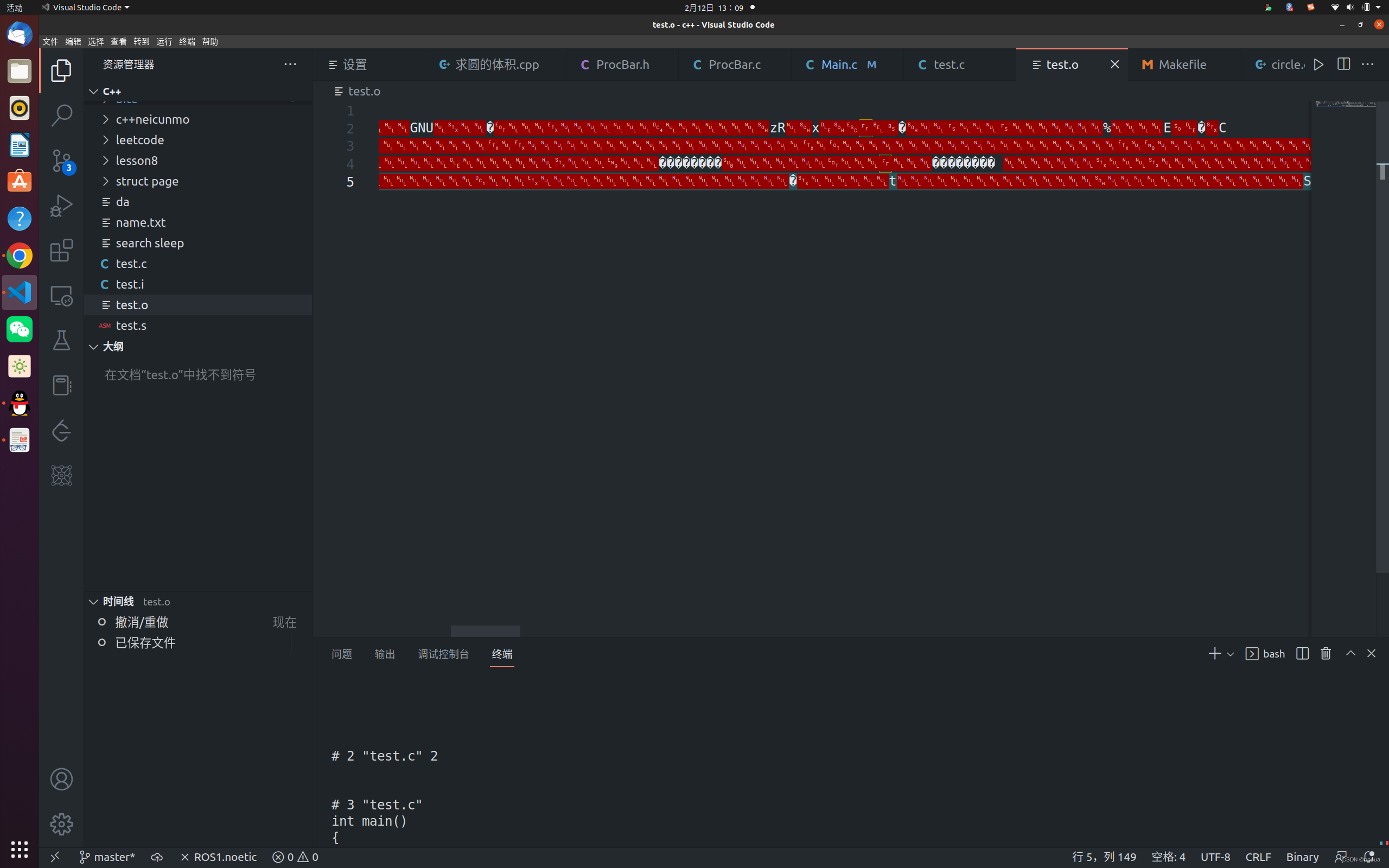
就生成了这样一个乱码文件(可使用elf格式进行编辑)
2.3链接
最后就是链接阶段,合并段表,并执行符号表的合并与重定位。
当多文件操作的时候,这部会将多个文件进行链接操作。(也可以理解为将多个文件合并为一个文件)
在gcc中执行 gcc test.o -o test
就会生成一个可执行程序。
3. 预处理详解
3.1 预定义符号
__FILE__
//进行编译的源文件
__LINE__ //文件当前的行号
__DATE__ //文件被编译的日期
__TIME__ //文件被编译的时间
__STDC__ //如果编译器遵循ANSI C,其值为1,否则未定义
#include<stdio.h>
#define MAX 5
int main()
{
printf(__FILE__);
printf(__FUNCTION__);
printf(__TIME__);
}执行结果如下。分别为文件名 函数名 时间

3.2 #define
#define name stuff语法为要定义的名字 与 具体的值
如
#define MAX 5如果定义的 stuff过长,可以分成几行写,除了最后一行外,每行的后面都加一个反斜杠(续行符)。
#define DEBUG_PRINT printf("file:%s\tline:%d\t \
date:%s\ttime:%s\n" ,\
__FILE__,__LINE__ ,\
__DATE__,__TIME__ )在define定义中不要加;
来看看这段代码,当条件成立时a=max否则b=max
#define MAX 5;
if true
a=MAX;
else
b=MAX;但是在预编译处理阶段会将这段代码翻译成这样,也就将else孤立了,会导致语法错误
#define MAX 5;
if true
a=MAX;;
else
b=MAX;;所以在define中不需要加入;
3.2.1#define 定义宏
#define 机制包括了一个规定,允许把参数替换到文本中,这种实现通常称为宏(macro)或定义宏(define macro)。
下面是宏的申明方式:
#define name( parament-list ) stuff其中的 parament-list 是一个由逗号隔开的符号表,它们可能出现在stuff中。
#define max(x,y) ((x>y)?x:y)参数列表的左括号必须与name紧邻。 如果两者中有空白的部分,则会被解释为stuff。
写宏时不要吝啬括号,否则会出现不好的结果
例如:定义平方和的宏
#define SQUARE( x ) x * x
int a = 5;
printf("%d\n" ,SQUARE( a + 1) );在预编译结束后这段代码会变成什么呢?
#define SQUARE( a+1 ) a+1 * a+1
int a = 5;
printf("%d\n" ,a+1 * a+1 );这时,显然结果改变了,所以我们应当这样定义宏
#define SQUARE( x ) ((x) * (x))
int a = 5;
printf("%d\n" ,SQUARE( a + 1) );3.2.2 #define 替换规则
在程序中扩展#define定义符号和宏时,需要涉及几个步骤。
1. 在调用宏时,首先对参数进行检查,看看是否包含任何由#define定义的符号。如果是,它们首先
被替换。
2. 替换文本随后被插入到程序中原来文本的位置。对于宏,参数名被他们的值所替换。
3. 最后,再次对结果文件进行扫描,看看它是否包含任何由#define定义的符号。如果是,就重复上
述处理过程。
注意:
1. 宏参数和#define 定义中可以出现其他#define定义的符号。但是对于宏,不能出现递归。
2. 当预处理器搜索#define定义的符号的时候,字符串常量的内容并不被搜索。3.2.3 #和##
#的作用是将变量名插入到字符串中
#include<stdio.h>
#define PRINTF(format,x) printf("the value of " #x " is " format "\n",x)
int main()
{
int a=4;
PRINTF("%d", a);
}这段代码预处理完为
int main()
{
int a=4;
printf("the value of " "a" " is " "%d" "\n",a);
}
##的作用是拼接两个常量
#include<stdio.h>
#define ADD_TO_SUM(num,value) value##num
int main()
{
printf("%f",ADD_TO_SUM(2.12, 2023));
}代码结果为

3.2.4 宏和函数对比
| 属性 | #define定义宏 | 函数 |
| 代码长度 | 每次使用时,宏代码都会被插入到程序中。除了非常 小的宏之外,程序的长度会大幅度增长 | 函数代码只出现于一个地方;每次使用这个函数时,都调用那个地方的同一份代码 |
| 执行速度 | 更快 | 存在函数的调用和返回的额外开销,所以相对慢一些 |
| 操作优先级 | 需要根据上下文判断 | 表达式求值更容易预测 |
| 调试 | 不可调式 | 可以逐语句调试 |
| 递归 | 宏不可以递归 | 可以递归 |
3.2.7 命名约定
把宏名全部大写
函数名不要全部大写
3.3 #undef
这条指令用于移除一个宏定义。
#undef NAME3.4 命令行定义
许多C 的编译器提供了一种能力,允许在命令行中定义符号。用于启动编译过程。
例如:当我们根据同一个源文件要编译出一个程序的不同版本的时候,这个特性有点用处。(假定某个程序中声明了一个某个长度的数组,如果机器内存有限,我们需要一个很小的数组,但是另外一个机器内存大些,我们需要一个数组能够大些。)
#include<stdio.h>
int main()
{
int array[MAX_SIZE];
int i=0;
for(int i=0;i<MAX_SIZE;i++)
scanf("%d",&array[i]);
for(int i=0;i<MAX_SIZE;i++)
printf("%d",array[i]);
return 0;
}在gcc下输入 gcc -D MAX_SIZE=10 test.c
这时MAX_SIZE的值就为10
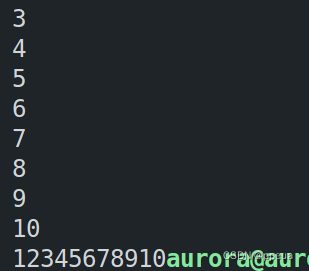
3.5 文件包含
我们已经知道, #include 指令可以使另外一个文件被编译。就像它实际出现于 #include 指令的地方一样。
这种替换的方式很简单:
预处理器先删除这条指令,并用包含文件的内容替换。
这样一个源文件被包含10次,那就实际被编译10次。
所以我们在写头文件的时候一般会加上
#ifndef _TEST_H__ //头文件名 (或者自己创建一个标识符)
#define _TEST_H__
//头文件内容
#endif这里的代码也很好理解,判断是否有这个定义,若没有则进入下面的内容,若有则结束,解决了头文件被重复包含的问题,当然也可以这样写。
#pragma oncce
完结撒花:
🌈本篇博客的内容【程序环境和预处理】已经结束。
🌈若对你有些许帮助,可以点赞、关注、评论支持下博主,你的支持将是我前进路上最大的动力。
🌈若以上内容有任何问题,欢迎在评论区指出。若对以上内容有任何不解,都可私信评论询问。
🌈诸君,山顶见!



